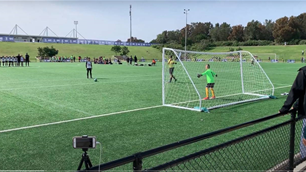Where’s the football in all this football science?
In the last 20 years, we’ve witnessed a revolution in sports science and technology – identifying and fine-tuning almost every aspect of the modern footballer. But to me there’s something missing. Where’s the football in all this football science?
Really, how many of these scientific innovations have actually improved our ability to develop skill in young players?
Thousands of footballers are trained using GPS technology; post-game recoveries include excruciating ice baths; coaches and physiotherapists monitor individual fitness; injuries are treated in hypobaric chambers or with experimental surgeries. Yes, these are all valuable improvements. But they’re geared toward improving the established, professional athlete.
Thousands of footballers are trained using GPS technology; post-game recoveries include excruciating ice baths; coaches and physiotherapists monitor individual fitness; injuries are treated in hypobaric chambers or with experimental surgeries. Yes, these are all valuable improvements. But they’re geared toward improving the established, professional athlete.
Of course, it makes sense – professional clubs are the ones with the money to spend on scientific research, and the incentive to optimize player performance. Coaches want to keep their (expensive) players in peak physical condition and get injured players back on the roster as quickly as possible.
But what are the consequences of a scientific agenda dictated by professional clubs?
Sadly for the sport, it means an almost complete absence of football in football science. Less than 5% of all published research on football players has attempted to measure a player’s skill, let alone trying to identify ways of improving it. By far, the majority of research focuses on fitness.
While fitness is important, it represents only part of what a footballer does on the field, and great footballers are not just those who can run up and down the pitch the fastest. No, we admire the freakish skills of Lionel Messi or the balance and grace of Zinedine Zidane. A fit and speedy player without sound kicking, dribbling, heading and passing technique is useless. Yet, these are the traits overlooked in most current-day football science.
Am I blaming professional football for this scientific stagnation? Oh, yes.
Professional clubs typically acquire players as developed professionals. There’s little incentive to develop revolutionary ways of enhancing skill in players once they’ve been signed for a club. It’s simply cheaper and easier to buy already skilful players than to develop them from pre-adolescence.
Furthermore, skill development in professional players is largely viewed as the domain of the footballing coach, not the scientist, which makes it difficult to advance the sport as a whole. If we asked ten FIFA A-License coaches their methods for developing technique in young players, then we’d probably get 10 different approaches. They’d be great – and effective – approaches, but how do they work? Why? Do particular approaches work better for particular players or leagues? These are scientific questions, and scientists are needed to ask them if we want to see better-performing footballers.
Furthermore, skill development in professional players is largely viewed as the domain of the footballing coach, not the scientist, which makes it difficult to advance the sport as a whole. If we asked ten FIFA A-License coaches their methods for developing technique in young players, then we’d probably get 10 different approaches. They’d be great – and effective – approaches, but how do they work? Why? Do particular approaches work better for particular players or leagues? These are scientific questions, and scientists are needed to ask them if we want to see better-performing footballers.
So, what do I advocate?
1. Making football science a national-level priority, funded and administered by national footballing councils rather than professional clubs.
2. Collaboration between coaches and skill scientists across all levels of the game.
3. Evaluation and development of footballing skill in addition to fitness.
I think any country that embraces these ideals in training the next generation of footballers will be a force to contend with in coming decades. Personally, I’d love to see Australia lead the way in a scientific agenda that embraces football skill and technique as the focus, and gain a head-start in innovation …
Think we can do it?
Related Articles

Fresh talent flock to ambitious A-League outfit's pro pathway

Why A-League 20/21 is crucial for Olyroos’ medal hopes













